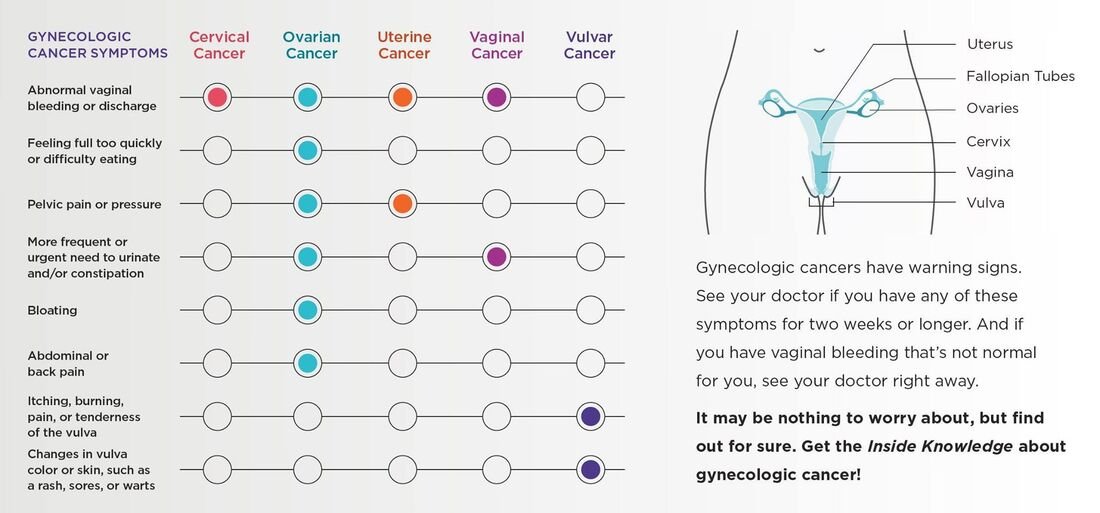
Learn About Gynecologic Cancer
Did you know there are 5 main types of cancer that affect a woman’s reproductive organs:
As a group, they are referred to as gynecologic (GY-neh-kuh-LAH-jik) cancer.
click the links above to learn more
Cervical Cancer
Early on, cervical cancer may not cause signs and symptoms. Advanced cervical cancer may cause bleeding or discharge from the vagina that is not normal for you, such as bleeding after sex. If you have any of these signs, see your doctor. They may be caused by something other than cancer, but the only way to know is to see your doctor.
Use the CDC Symptoms Diaries to track possible symptoms over a two-week timespan:
Ovarian Cancer
Ovarian cancer may cause one or more of the following signs and symptoms:
Vaginal bleeding (particularly if you are past menopause) or discharge from your vagina that is not normal for you.
Pain or pressure in the pelvic or abdominal area (the area below your stomach and in between your hip bones)
Back pain
Bloating, which is when the area below your stomach swells or feels full. • Feeling full too quickly or difficulty eating
A change in your bathroom habits, such as more frequent or urgent need to urinate and/ or constipation
Pay attention to your body, and know what is normal for you. If you have vaginal bleeding that is not normal for you, see a doctor right away. If you have any of the other signs for two weeks or longer, see a doctor. These symptoms may be caused by something other than cancer, but the only way to know is to see your doctor. Treatment is most effective when ovarian cancer is found and treated early.
Uterine Cancer
Signs and symptoms of uterine cancer include:
Vaginal discharge that is not normal for you
Abnormal vaginal bleeding. The bleeding may be abnormal because of how heavy it is or when it happens, such as bleeding after you have gone through menopause; bleeding between periods; or any other bleeding that is longer or heavier than normal for you.
Pain or pressure in your pelvis. Pay attention to your body, and know what is normal for you. If you have vaginal bleeding that is not normal for you, see a doctor right away. If you have any of the other signs and they last for two weeks or longer, see a doctor. These symptoms may be caused by something other than cancer, but the only way to know is to see your doctor.
Vaginal Cancer
Most vaginal cancers do not cause signs or symptoms early on. When vaginal cancer does cause symptoms, they may include:
Vaginal discharge or bleeding that is not normal for you. The bleeding may be abnormal because of how heavy it is, or when it happens, such as bleeding after you have gone through menopause; bleeding between periods; or any other bleeding that is longer or heavier than is normal for you.
A change in bathroom habits, such as having blood in the stool or urine; having more frequent or urgent need to urinate; or feeling constipated.
Vulvar Cancer
Vulvar cancers often cause signs or symptoms including one or more of the following:
Itching, burning, pain or tenderness on the vulva that does not go away
Changes in vulva skin color, where it is redder or whiter than normal for you
Changes on the vulva skin, such as a rash, warts, sores, lumps or ulcers
Pay attention to your body, and know what is normal for you
If you have vaginal bleeding that is not normal for you, see a doctor right away. If you have any of the other signs that may be associated with vaginal or vulvar cancer, and they last for two weeks or longer, see a doctor. These symptoms may be caused by something other than cancer, but the only way to know is to see your doctor.

